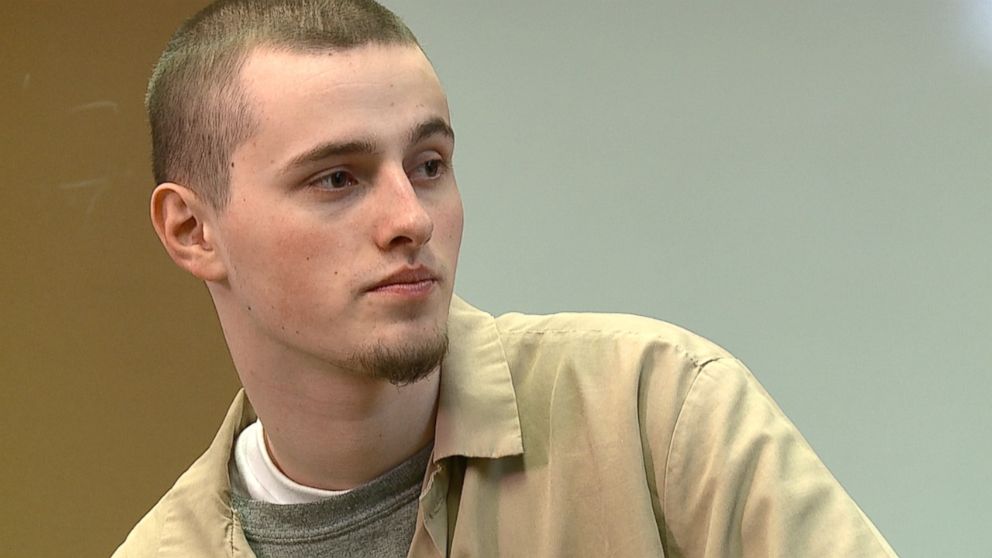The Controversial Felony Murder Case of The Elkhart 4: Should Teens Be Sentenced to 50 Years in Prison?
An in-dept look at the controversial felony murder case of the Elkhart Four.
— -- On one day, with one bad decision, the lives of four teens were shattered.
It was an afternoon much like any other in the quiet suburb of Elkhart, Indiana, when five friends gathered on a porch.
“I got off school that day... we ended up talking, coming up with a dumb a-- plan,” said Blake Layman from his cell at the Wabash Valley Correctional Facility in Terre Haute, Indiana.
That "dumb plan" resulted in one teen being shot dead and his teenage friends convicted of murder – even though they weren't the ones who pulled the trigger. They now face sentences of as much as 55 years in prison in a case that has sparked outrage and a re-examination of the nature of juvenile crime and punishment.
It was October 2012. Layman and his best friend, 17-year-old Levi Sparks, were hanging out with a few other friends, Jose Quiroz, Anthony Sharp, and Danzele Johnson. Their “dumb plan,” as Layman remembers it, was to rob an empty house. Layman said none of them were armed.
“It was a plan to get quick money,” Layman said. “It was never a plan to hurt anyone or even confront anyone.”

Levi Sparks decided to stay behind on the porch, where he said one of the guys asked him to act as a lookout.
“He was like, ‘OK if anyone comes, call us,’ and they took off,” Sparks said.
After checking a couple of nearby houses, Layman said the group decided to bang on the door of a house across the street from where Sparks was waiting on the porch. They “knocked and knocked” on the door and rang the doorbell, Layman said, but no one answered.
But the homeowner, Rodney Scott, then 54, was home. He was upstairs napping after a night of insomnia. He testified in court the machine he uses for sleep apnea had drowned out the knocking.
Scott finally woke up when Danzele Johnson, according to the others, kicked in his back door. Scott would later say in court that he feared his home was being burglarized so he grabbed his gun, a 9mm handgun.
“I ran through the kitchen to the [first floor] bedroom,” Layman said. “First thing I heard was gunshots.”
“Fear comes over you, and you don’t know if you’re going to get hurt or if you’re going to get killed,” Scott later testified in court. “Seeing that they were right there at the [first floor] bedroom door, that’s when I decided that I was going to fire my gun and try to trap them.”
“I was shot entering the closet,” Layman said. “I felt something warm and I came up with a handful of blood. That’s when I realized, [I’d been] shot in the leg.”
Slumped next to Layman was Johnson. He had been shot in the chest, bleeding heavily.

“[Johnson] died right in between me and Jose,” Layman said. “We were both right there next to him."
"I remember screaming, ‘I’m sorry,’ just over and over again," he continued. "I was sorry period. It was a bad situation. I was sorry for it all.”
Word spread around the small town and Layman’s mother started to think that her son was involved somehow.
“I just knew because Blake wasn’t answering his phone, I couldn’t find him,” Angie Johnson said. “The rumor going around the neighborhood [was] one’s passed away, one’s living, so it’s like I don’t know if mine was alive or not.”
“It was my birthday that they called me and said that he had been arrested for murder,” said Levi's mother, April Sparks.
The homeowner, Rodney Scott, was not charged with a crime because prosecutors determined he acted in self-defense.
“That was one of the hardest parts about the whole thing, was explaining to these kids that they were being charged with murder,” Layman’s mother Angie said. “They didn’t understand.”
Layman was 16 years old at the time, the oldest of three children, and a sophomore in high school.
“He’s the type of boy... if we were driving down the road and somebody had a flat tire, he would get out and help,” said his mother, Angie Johnson.
“My thought is, ‘Murder? Maybe they don’t know what happened. Maybe they thought we hurt him,’” Blake Layman said. “I thought it would get cleared up.”
“I didn’t really comprehend it,” Levi Sparks said. “I didn’t put my mind around what I was about to go through.”
But it wasn’t a misunderstanding. Felony murder is used when someone dies during certain crimes – everyone committing that crime can be charged with murder.
“You break into a home, you home-invade a home, is it foreseeable that someone might get hurt? The answer to that would be yes,” said former prosecutor and legal analyst Nancy Grace. “Is it foreseeable that homeowner is going to shoot you? The answer is yes.”
Indiana and at least 42 other states have felony murder on the books, but how it’s applied, as in the case with the four boys who came to be known as the Elkhart Four, can be controversial.
The Elkhart Four faced the possibly of decades in prison.

One of the four, Jose Quiroz, pleaded guilty and was sentenced to 45 years in prison and 10 years probation in December 2012. The other three – Blake Layman, Levi Sparks and Anthony Sharp – had put their fate in the hands of a jury.
Their trial lasted four days. On August 22, 2013, a jury of four men and eight women deliberated for just five hours before handing down their verdict: all three boys were found guilty of felony murder.
Walter, one of the jurors in the Elkhart Four trial who did not want his last name used, told "Nightline" he struggled with the verdict, and felt his hands were tied.
“I’m still torn over it. Have a hard time talking about it really,” he said. “Four young kids not even participating in the shooting and to be convicted of it, that’s the hard part to swallow... Age should have been a consideration in this one.”
The following month, an Elkhart County judge sentenced Sparks, the lookout, to 50 years in prison. Layman and Sharp were both given 55 years.
Elkhart County Prosecutor Curtis Hill, Jr., and his team, who had charged the boys and brought the case to trial, declined “Nightline’s” requests for an interview or comment because of a pending appeal.
After the verdict was handed down in 2013, Hill told reporters at the time, “When we filed the charges we believed it was appropriate that when someone commits a felony, and a person dies as a result, Indiana law is very clear,” the Associated Press reported.
He believes the case could be taken up by the United States Supreme Court, which has previously ruled in separate cases that juveniles should not be sentenced to the death penalty, nor sentenced to life without the chance of parole because the juvenile brain isn’t fully developed. In their decisions on these cases, the Supreme Court cited medical research on brain development when weighing in on how much teenagers can be held accountable for their actions.
“What the Supreme Court has said repeatedly and what common sense should tell every parent, every prosecutor, is that teenagers often have a difficult time controlling impulsive behavior,” Drizin said. “The growing consensus is that the juvenile brain continues to develop throughout adolescence and even into the early twenties and it develops precisely in the areas that govern judgment, the exercise of reasoning, weighing risks.”
But Nancy Grace believes that a felony murder charge can serve a purpose.
“As a prosecutor, many times, I was in the horrible position of sending a young man to jail, or letting him walk free on the street, and I did not want to send young men to jail, but that very often is the only alternative, and here, you’ve got a dead body,” Grace said.
Following sentencing, Layman and Sparks were transferred to the Wabash Valley Correctional Facility. Layman, because he was still a minor at age 17 by this point, was placed in D Block, the prison’s juvenile housing unit, but once he turned 18, he would be moved to the adult side of the prison. Young offenders at this facility are kept separate from the adult prison population.
The hardest part about prison, Layman said, is being away from his family.
In his cell, Layman has a few pictures, including his little sister Destiny, who has been fighting a brain tumor since she was an infant. Since their dad wasn’t around, Layman said he had always been there for her, through chemo, and helping his mother at home. He also has a 2014 calendar, with the “14” crossed out and replaced with “40.” The year 2040 is the earliest Layman could get out with good behavior.
Sparks, who turned 18 while behind bars, is now over on the adult side of the prison. His cellmate is more than 40 years his seniors, doing hard time: 65 years.
“Being behind bars, it’s something that’s not like being on the outs. Ain’t nothing like being on that outs,” he said.
Sparks has marked his time in prison literally on his body. A tattoo of a broken hourglass with the number 50 is just one of the many he has gotten illicitly while in prison.
“The spider webs represent that you are trapped and the hour glass – it's broken – show that it's wasted time,” he said.




